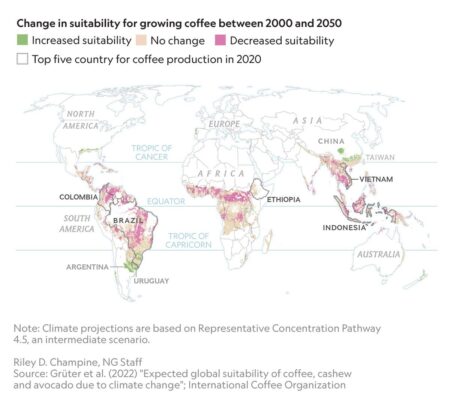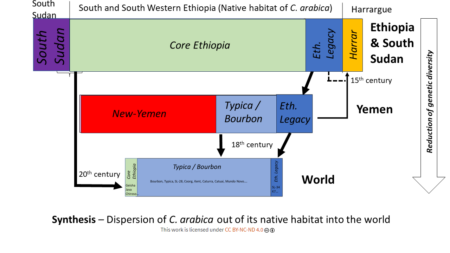- What has agrobiodiversity ever done for us? Kent Nnadozie of the Plant Treaty lays it out.
- Michael Frei of the HealthyDiets4Africa project doesn’t need it laid out.
- Neither do the people who awarded a prize to Charlotte Allender of the UK Vegetable Genebank.
- What has the US National Plant Germplasm System ever done for anyone? The Guardian, the NY Times and NPR News lay it out. I guess someone in D.C. needs it laid out, but will it make any difference?
- Everyone: Potatoes in Florida! Breeders: No problem. NPGS: You called?
- Here’s The Guardian again, but this time thinking it is making the case for not putting seeds in the fridge, whereas in fact it’s making the case for the complementarity of ex situ and on-farm conservation.
- Speaking of on-farm conservation, here’s a couple of pieces on community seed banks in Guatemala.
- Speaking of on-farm conservation, here’s the heart-warming story of Welsh organic farmer Gerald Miles.
- Meanwhile, the World Vegetable Centre opens a new genebank.
- And Türkiye hosts an international, no less, olive genebank.
- And genebanks can be so beautiful, like works of art. Former Tate Modern director Vicente Todolí lays out his citrus samples. I wonder what he could do with olives.
- Botanic gardens are beautiful and often act a little bit like crop genebanks. Here’s an example from Portugal I stumbled onto recently, I forget how.
- You know what I’d like to see? An international pepper genebank, that’s what. No, not the kind that might be in those Guatemalan community seedbanks or the WorldVeg genebank. This sort of pepper. Piper pepper.
- I bet the ancient Egyptians had pepper. Egyptian archaeologist Mennat-Allah El Dorry lays out what else they had.
- Maybe you could lay out world history using pepper. You can definitely do so using cacao and chocolate.
- No, not using ancient DNA, but actually…
Brainfood: Ag and CC, Improved varieties, Yield growth, Food system transformation, CGIAR maize, Genetic erosion, NBSAPs, Technology & conservation, Cattle breeding
- Conventional agriculture increases global warming while decreasing system sustainability. The global warming potential of conventional grain agriculture has increased x8 from 1961-2020, whereas sustainability index has decreased x3. Whatever are we to do?
- Adoption of improved crop varieties limited biodiversity losses, terrestrial carbon emissions, and cropland expansion in the tropics. Crop improvements from 1961–2015 resulted in less cropland expansion, lower greenhouse gas emissions and fewer extinctions. Right, so what we need is more of the same?
- Yield growth patterns of food commodities: Insights and challenges. “The same” has meant that yield growth for dozens of crops is not slowing down. At least in the global aggregate. At least for now. At least for calories. So no resting on laurels out there!
- Governance and resilience as entry points for transforming food systems in the countdown to 2030. Especially as regards governance and resilience.
- Poverty and yield effects of CGIAR maize varieties in smallholder farming systems of Zambia. CGIAR breeders are definitely not resting on their laurels, but it looks like that won’t be enough.
- Global meta-analysis shows action is needed to halt genetic diversity loss. CGIAR and other breeders are going to need that genetic diversity that is being lost. Whatever are we to do?
- How can biodiversity strategy and action plans incorporate genetic diversity and align with global commitments? We could make better, more inclusive biodiversity conservation plans, for one thing. Which include agricultural biodiversity.
- Exploring the role of technology in the trade-off between biodiversity and poverty alleviation across countries. It would be good if those better plans included technology adoption.
- Liberalization of animal genetic resources trade and local animal productivity outcomes: A natural experiment. And yes, genetic diversity is a technology. Sort of.
Save our coffee!!!
The American Geographic Society had a very informative post about coffee prices on Facebook a few days back. I don’t really want to link to it, but I’m sure you can find it if you want. Anyway, here’s the text.
Coffee prices have hit a 50-year high due to a combination of rising costs of production, supply chain disruptions, and climate change–related declines in crop yields. Coffee plants are sensitive to changes in precipitation and temperature, and recent droughts in Brazil and Vietnam resulted in poor harvests. Coffee companies are passing on the extra costs to customers, with the average retail price of ground roast coffee increasing 15 percent in American cities in the past year and peaking at over $7 a pound. As climate change will continue to threaten coffee harvests in the years to come, projected to shrink the land available for coffee cultivation by half, prices are expected to keep rising.
They also helpfully link to three recent supporting articles in the NY Times, The Independent and on ABC News.
And they reproduce a map from a National Geographic article from a couple of years back.

Social media as it should be done.
And since we’re on the subject, there are some very cool resources on coffee diversity on the website of Christophe Montagnon, a renowned expert on the crop. For example, I really like this summary of the global history of arabica.

We’re going to need those resources — and indeed that diversity — if we want to keep drinking coffee.
Nibbles: Genebanks in the US, CIAT, Egypt, Cambridge Botanic Garden, Chilean wild tomato, Kenyan veggies, PNG diet, PGRFA course
- The USDA genebank is in the news. But will that save it?
- The CIAT genebank in on a podcast. Can’t hurt, I guess.
- The Egyptian genebank is in the news. And on a new website, apparently.
- Good to see botanic gardens in the news too.
- I wonder which genebank or botanic gardens this apparently re-discovered endemic Chilean wild tomato will end up in. If any.
- But genebanks are not enough. You need vegetable fairs too.
- Because vegetables are good for you. And not just in Kenya, also in Papua New Guinea.
- Want to learn about all of the above? Check out the resources from the Entry-Level Training School on Plant Genetic Resources in 2023.
Brainfood: QMS, Seed viability, Genotyping, Taxonomy, FAIR data, Evaluation data, Lentil data, Indian cryobank, Home genebank, Dry chain, Botanical gardens, Environmental monitoring, Bending the curve
- Quality management in a genebank environment: Principles and experiences at the Centre for Genetic Resources, The Netherlands (CGN). Do we need a certification system for genebanks? We do have the means to put one together.
- A pragmatic protocol for seed viability monitoring in ex situ plant genebanks. But will genebank certification allow much-needed flexibility?
- Genotyping Genebank Collections: Strategic Approaches and Considerations for Optimal Collection Management. Or will it make everyone genotype everything?
- Assigning Species Names to Ambiguous Populations in the US Potato Genebank. Oh, you want an example of why everyone should genotype everything?
- The FLAIR-GG federated network of FAIR germplasm data resources. For sure it should require data to be FAIR.
- The EURISCO-EVA Information System, an innovative approach to the data management of multi-site crop evaluation data. Even evaluation data, though? That usually comes from genebank partners, not the genebanks themselves. Wouldn’t that be a problem?
- A case study on lentil to demonstrate the value of using historic data stored in genebanks to guide the selection of resources for research and development projects. Oh, you want an example why evaluation data should be included in (or linked to) genebank documentation systems?
- Indian cryogenebank conserving diverse plant genetic resources for the last three decades: Achievements and way forward. Is it certified, though?
- Share a Tiny Space of Your Freezer to Preserve Seed Diversity. Meanwhile, at the other end of the technology continuum…
- Applications of dry chain technology to maintain high seed viability in tropical climates. If your freezer is in the tropics, think about handling your seeds this way. And maybe you’ll get certified :)
- Insights from a century of data reveal global trends in ex situ living plant collections. Maybe botanic gardens should be certified too, presumably. Would it have made a difference? Actually, now I think of it, does this mean the system as a whole needs to be certified? Anyway, good thing the data were FAIRish.
- A framework for long-term environmental monitoring using living plant collections in botanic gardens: A global review and case study from Trinity College Botanic Garden. Another example of the benefits of FAIR evaluation data. And of botanical gardens.
- Sustainable high-yield farming is essential for bending the curve of biodiversity loss. And genebanks (and maybe botanical gardens too, why not?) are essential for sustainable high-yield farming. Certify that.